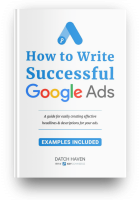Another big change coming out of Google’s Marketing Live event is less splashy—and on the surface, just as exciting as a discussion about cybersecurity best practices. While we all feel angry when our data is exposed, we can admit that most of us aren’t always proactive about staying safe online. And yes, Google PPC is making public moves toward a more transparent privacy policy.
While the search giant will likely continue to collect mounds of data for the foreseeable future, they may start making some changes in order to appease the end user.
Though the media hasn’t talked much about what’s ahead for Google Ads and how they’ll be using data moving forward, it’s one of the more important conversations we need to be having right now. Here, we’ll look at how privacy is changing PPC for advertisers, e-commerce sellers included.
How are Privacy Initiatives Changing PPC, Anyway?
For starters, there’s the California Consumer Privacy Act. There is also the growing concern among the public about how platforms like Google and Facebook use customer data for their gain. Google Ads’ SVP, Prabhakar Raghavan, said that privacy is becoming a bigger priority among regulators as they wrestle with the implications of big data.
Raghavan says customers are redefining their expectations. If we read between the lines here, we’d venture to guess that this means most people feel conflicted about privacy protections.
These days, consumers expect a multichannel experience, where they can move between various online platforms and devices seamlessly, all while receiving relevant recommendations and eliminating the need to enter complicated passwords multiple times a day.
The tricky part is that those same customers expect this level of convenience while also wanting their privacy protected at the same time. Further, consumers don’t seem willing to pay for something they’ve been getting for free for the past two decades, even if that means no ads.
Then just this past August, Google unveiled a new consumer privacy proposal. You can read the full piece right here, but the plan is centered around three core principles: transparency, choice, and control.
- Transparency—users will be able to see and understand why and how data is collected, particularly in its application for advertising purposes.
- Choice—users will have more control over their online experience.
- Control—users will have more customization options for how their data is collected and what it is used for, particularly where ads are concerned.
That’s all well and good, but it’s hard to get a sense of what this all means for advertisers, consumers, and even big tech.
For instance, the document leads by reminding readers that the internet as we know it wouldn’t be possible without ads. And it goes on to criticize cookie-blocking, which Google states could hurt publisher revenue more than the recent core algorithm update.
Under the proposal, most individualized user data would remain in a device’s browser. That data would then be used to categorize the specific user to an anonymous aggregated group of users—like you’d find in Google Audiences. Still, the focus seems to center on building trust with consumers, while remaining useful for advertisers.
While this basically sounds like the same arrangement that Google has had with its users all along, the idea is that they’re working to better protect user identities. Under the new proposal, users would not be added to a group of similar users until the system can be sure there are thousands of other people in that group. But, even as it stands now, individual users can learn a lot about their personalized ad settings or why they’re seeing a particular ad.
What is the CCPA and How Will it Impact Advertisers?
Those US-based advertisers that didn’t have to accommodate GDPR will now need to think about the impact of the California Consumer Privacy Act (CCPA). The new rule goes into effect January 1, 2020, and it stands to impact any company that does business online in the States (unless they’re targeting a specific region that’s outside California). Chances are, however, if you’re in e-commerce, the CCPA applies to your business.
The California Consumer Privacy Act or CCPA is designed to accomplish three things.
- Consumers will have the right to know exactly what information companies collect about them and how their data is being used.
- Businesses need to be open about how they use personal information to create targeted ads. This includes things like how they use behavioral data to personalize the buyer’s experience, as well as how they make decisions about dynamic pricing. (As a quick reminder, dynamic pricing allows brands like Amazon to change pricing based on demand, traffic, time of day, or even behavioral or economic factors.)
- Customers will have the right to say no to any data collection activities they don’t feel comfortable with. This means that consumers will have the option to ask a company to delete personal information, with the law requiring full compliance from the company.
From a consumer perspective, the CCPA probably won’t change the internet experience much at all. Think back to last year when the GDPR rolled out. The impact was felt beyond European borders, but for consumers, it meant getting a lot of emails from long-forgotten e-commerce companies, cookie notifications, and eliminating pre-filled checkboxes from email sign-up lists.
The key thing to keep in mind here is that customers will have more access to the large file of information that businesses collect on them. As it stands, companies like Google know your current location, family members, age, browsing history, income, and more. And, of course, they use that information to build a better advertising product for companies of all shapes and sizes.
Under the new rule, businesses will be held accountable if the information they collect is compromised due to insufficient preventative security measures. Ultimately, the rules likely won’t completely shake up the advertising environment for PPC users; in all likelihood, they may just need to add new language to their privacy policies. And of course, for those that do business in CA, failing to comply could mean getting slapped with a fine.
Will Privacy Controls Impact the Effectiveness of PPC Ads?
Privacy concerns are on the rise. Just look at the Facebook and Google lawsuits, and YouTube’s extremist algorithm woes. And then there are the instances of location tracking without users’ consent, or smart assistants secretly recording their owners. And, of course, let’s not forget the data breaches from Target to Experian.
As Google expands its offerings—to advertisers and searchers alike—we may run into some limitations when it comes to understanding what drives people to our businesses. Customer match was scaled back not too long ago, due to a few bad-apple advertisers submitting lists of users without their consent.
As a result, there is a possibility that we might see more black-box type controls over customer data (e.g. Google keeps using machine-learning algorithms to inform strategies like smart bidding or the triggering of display network content). The catch is that they might keep the “why” behind your ad performance close to the chest. Without access to this data, we may find it harder to make personalized recommendations and offers that truly match buyer intent. Here’s a look at Google’s current privacy policy, in case you’re curious.
Wrapping Up
Ultimately, there will likely be some changes coming to the Google ecosystem, as well as other channels like Facebook, Twitter, and Instagram.
The CCPA and Google’s privacy proposal stand to give customers a bit more control over what companies can collect about their online activities. With that said, on a day-to-day basis, the browsing experience probably won’t change much, save for a few more notifications about location tracking or cookies.
Any big changes to Google bidding, ad formats, and audience data remain to be seen. However, we’ll be keeping our eyes peeled over the next few months to see what’s next for PPC advertisers where privacy is concerned.
If you’re looking for help creating ad campaigns in compliance with GDPR and CCPA, get in touch with us. We’ll set up your account so it drives growth while keeping consumer data safe. Learn more by clicking here.











